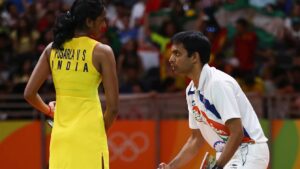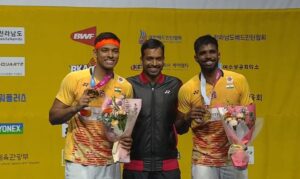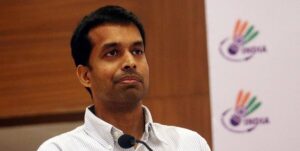
On Monday, March 4, we kickstart the Trailblazers Conclave 2.0 with a Pullela Gopichand press conference.
Why did we pick Gopi? Why is he special? What makes him different, and the best person to start the conclave?
PV Sindhu had just won her Olympic Games quarterfinal in Rio Di Janeiro in 2016 against the legendary Wang Yihan of China, and all of us, members of the Indian media contingent, were euphoric. One more win, and Sindhu could finally end India’s medal drought. It was late evening in Rio that same day when I met Gopi at the gate of the Olympic Games village. It was past 9pm, and I had just finished a round of interviews with some of our boxers. Gopi was alone, and pacing up and down rather aimlessly. He hadn’t seen me and was somewhat surprised when I walked up to him.
I had known Gopi for years and rarely had I seen him as anxious. He looked almost frail. “Let’s talk after the match tomorrow, Boria,” he said when we were face to face. “I am tired of Indians coming fourth. I really can’t take another fourth-place finish. If she wins tomorrow, she is sure of a medal, and once that happens, I will come with you to Christ the Redeemer and celebrate.”
Gopi was in full flow. “I have not properly smiled for months now,” he said. “Lost 8-10 kilograms in the last few months for this one day. Time we win a medal.” With that, he walked back inside the village, leaving me with many unasked and unanswered questions.
For the Latest Sports News: Click Here

I had followed Gopi closely leading in to the Olympics, and could immediately relate to what he was saying. Everything that he tried out was self-taught, for there was no model in front of him. Trial and error and experiment, hoping it would work, but at the back of it all was science and a desperate will to succeed. His day between January and August 2016 would start at 4:30am with Sindhu, and then continue till 11:30am with Kidambi Srikanth and the rest of his wards. Sindhu and Srikanth had their dedicated times with their coach, having qualified for the Olympics, and there were separately assigned practice times for particular strokes for each of them.
So how does he produce a champion, I had asked him once. I was aware the question wouldn’t have a straightforward answer. It is no mathematical formula, for then it would be replicated by every country that could afford it.
“What do you understand by a champion?” Gopi asked me in return. And before I could say a word, he started speaking. “By a champion, I understand a player who knows how to keep winning consistently. To know how to win is an art. Everyone at this level can play well. But not everyone knows how to win. At 17-17, all you need to be a little more than a good player is to close out the game. That’s something I think I am good at, and do from behind. That’s what has helped me nurture these players. That’s what was missing in India, and that’s what I have tried to learn over the years. Once they learn the process, I will move on to working on younger men and women who will need to be groomed going ahead.”
Very Gopi. Straightforward and simple. Decoding the process as if it wasn’t something really difficult.
“The process, as I have said to you, is what is most important,” he continued. “All people see is what they do in tournaments. Sindhu was hailed for playing a 100-minute match at the 2017 Glasgow World Championships. Saina [Nehwal] has managed to play at the highest level for a decade and more. This is because they trained close to five hours most days, spread into two halves – morning and evening.”

How he knew all this was what interested me. Before Gopi, it was Prakash Padukone in the 1980s, and then the occasional Syed Modi or Vimal Kumar or Dipankar Bhattacharyya. None of them were world-beaters and there was no tradition and no real structure. Gopi’s academy, in the true sense, came out of nowhere. Maybe that’s why, in the first four years, not a single sports journalist entered its confines. “Yes, between 2004 and early 2008, the media wasn’t interested,” Gopi told me with a smile. “No one came and no one was really following what I was trying to do or was doing. Not that it mattered because I could do my initial planning away from the glare of cameras, which is actually not such a bad thing.”
Things have not been easy for Gopi. From mortgaging his house to raise money for the academy, and also dealing with his mother’s cancer, every step of the way has been a first in the history of Indian sport. And yet he stays humble and modest, something that won’t change even if he manages to get India another medal in Paris, this time in doubles.
Frankly, nothing much will happen as far as Gopi is concerned. Even the day after winning the medal with Satwiksairaj Rankireddy and Chirag Shetty, Gopi will still likely to be at the academy at 5am in the morning, racquet and shuttle in hand, thinking of how to improve further. The next Super Series is a month away, he will say. He will then go on to add: “The goal is not medals, you know. Medals are just one aspect of the story. Sport helps us in a number of intangible ways. It helps us become better men and women and, most importantly, deal with crises better.

“When you fail an exam, you don’t come out of your homes and, in extreme cases, commit suicide. Sport gives you multiple chances. Your loss is public, so you can’t really run away from it. All you do is pull yourself up, seek family support and come back the next morning trying to rectify your mistake. And when you do so, you are already a winner. Everyone who plays sport is a winner. Not always do you have to win medals. If we all come to terms with this aspect of sport, we would be a better society.”
Yes, again something that was self-taught.
What he left unsaid was that you “also create champions in the process”.
But I do know why he never said that. It is because champions are never satisfied. And Gopi, in every sense, is one. A man who will leave behind a legacy that he himself has created and nurtured, and one that generations after him will follow.
No one better to start the conclave.
Also Read: Women power: Sania Mirza and Nikhat Zareen at Trailblazers Conclave on International Women’s Day



